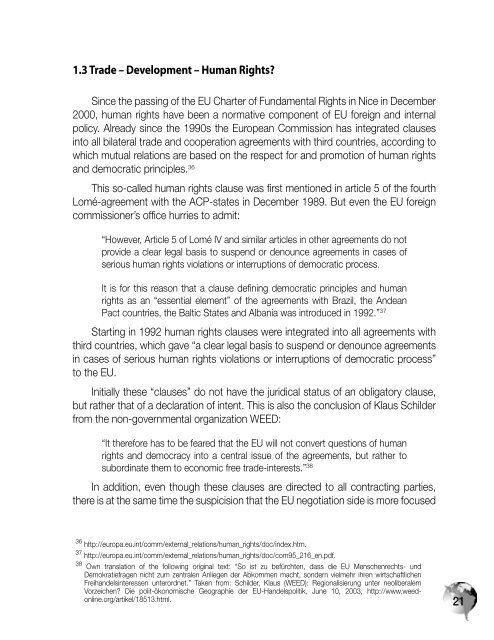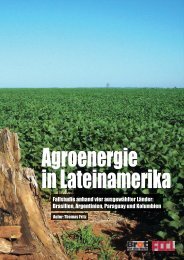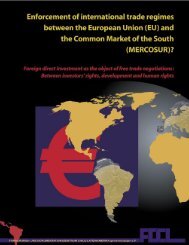Download - FDCL
Download - FDCL
Download - FDCL
Create successful ePaper yourself
Turn your PDF publications into a flip-book with our unique Google optimized e-Paper software.
1.3 Trade – Development – Human Rights?<br />
Since the passing of the EU Charter of Fundamental Rights in Nice in December<br />
2000, human rights have been a normative component of EU foreign and internal<br />
policy. Already since the 1990s the European Commission has integrated clauses<br />
into all bilateral trade and cooperation agreements with third countries, according to<br />
which mutual relations are based on the respect for and promotion of human rights<br />
and democratic principles. 36<br />
This so-called human rights clause was first mentioned in article 5 of the fourth<br />
Lomé-agreement with the ACP-states in December 1989. But even the EU foreign<br />
commissioner’s office hurries to admit:<br />
“However, Article 5 of Lomé IV and similar articles in other agreements do not<br />
provide a clear legal basis to suspend or denounce agreements in cases of<br />
serious human rights violations or interruptions of democratic process.<br />
It is for this reason that a clause defining democratic principles and human<br />
rights as an “essential element” of the agreements with Brazil, the Andean<br />
Pact countries, the Baltic States and Albania was introduced in 1992.” 37<br />
Starting in 1992 human rights clauses were integrated into all agreements with<br />
third countries, which gave “a clear legal basis to suspend or denounce agreements<br />
in cases of serious human rights violations or interruptions of democratic process”<br />
to the EU.<br />
Initially these “clauses” do not have the juridical status of an obligatory clause,<br />
but rather that of a declaration of intent. This is also the conclusion of Klaus Schilder<br />
from the non-governmental organization WEED:<br />
“It therefore has to be feared that the EU will not convert questions of human<br />
rights and democracy into a central issue of the agreements, but rather to<br />
subordinate them to economic free trade-interests.” 38<br />
In addition, even though these clauses are directed to all contracting parties,<br />
there is at the same time the suspicision that the EU negotiation side is more focused<br />
36 http://europa.eu.int/comm/external_relations/human_rights/doc/index.htm.<br />
37 http://europa.eu.int/comm/external_relations/human_rights/doc/com95_216_en.pdf.<br />
38 Own translation of the following original text: “So ist zu befürchten, dass die EU Menschenrechts- und<br />
Demokratiefragen nicht zum zentralen Anliegen der Abkommen macht, sondern vielmehr ihren wirtschaftlichen<br />
Freihandelsinteressen unterordnet.” Taken from: Schilder, Klaus (WEED): Regionalisierung unter neoliberalem<br />
Vorzeichen? Die polit-ökonomische Geographie der EU-Handelspolitik, June 10, 2003, http://www.weedonline.org/artikel/18513.html.<br />
21









